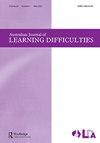家长对孩子辅助阅读干预的体验:质性探索
IF 1.6
Q3 EDUCATION, SPECIAL
引用次数: 2
摘要
摘要本文研究了12位阅读能力低下儿童家长的生活经历。从墨尔本的五所公立学校招募了家长,每位家长都参加了单独的访谈。分析显示,大多数孩子接受阅读恢复,这是第一个也是唯一的选择。家长对孩子在这个项目后的阅读结果的满意度存在分歧。不满意的原因包括:干预开始的等待名单,基于100次限制的阅读恢复突然停止,以及阅读恢复的理论倾向于建构主义原则。一半的父母独立地从传统和非传统的服务提供者那里寻求外部阅读干预。此外,许多父母因孩子的阅读困难而付出了个人代价。本研究强调了家长的需求,他们是管理低进步读者的重要利益相关者。我们的研究结果呼吁教育工作者、政策制定者和低进步学生的家长采取更系统、更综合、更谨慎的方法。本文章由计算机程序翻译,如有差异,请以英文原文为准。
Parents’ experiences of their children’s supplementary reading intervention: A qualitative exploration
Abstract We examined the lived experiences of twelve parents of low-progress readers. Parents were recruited from five state schools in Melbourne and each participated in individual interviews. Analyses revealed that most children received Reading Recovery which was the first and often only option. Parents were divided regarding satisfaction with their children’s reading outcomes following this program. Sources of dissatisfaction included: a waiting list for commencement of intervention, the sudden cessation of Reading Recovery based on the 100-session limit, and Reading Recovery’s theoretical orientation towards constructivist principles. Half the parents independently sought external reading intervention from conventional and non-conventional service providers. Moreover, many parents encountered a personal toll related to their children’s reading difficulty. This study highlights the needs of parents who are important stakeholders in the management of low-progress readers. Our findings call for a more systematic, integrated and mindful approach between educators, policy makers and parents of low-progress readers.
求助全文
通过发布文献求助,成功后即可免费获取论文全文。
去求助
来源期刊

Australian Journal of Learning Difficulties
EDUCATION, SPECIAL-
CiteScore
1.80
自引率
11.10%
发文量
8
 求助内容:
求助内容: 应助结果提醒方式:
应助结果提醒方式:


